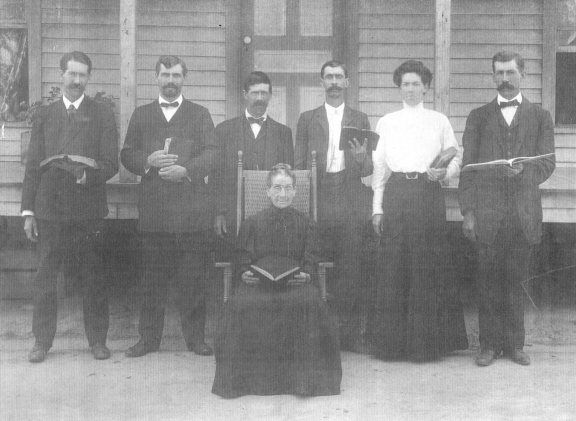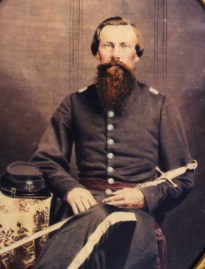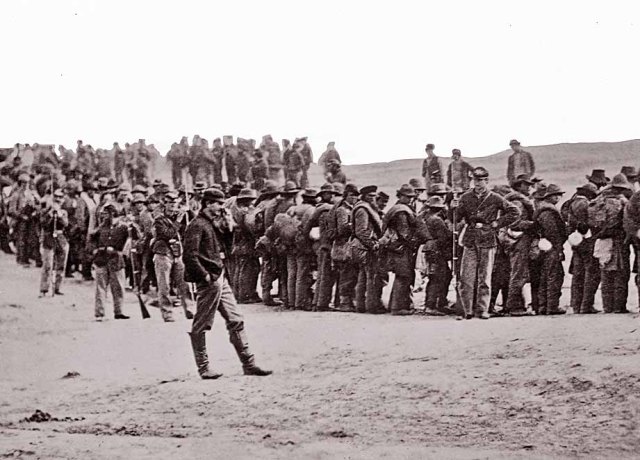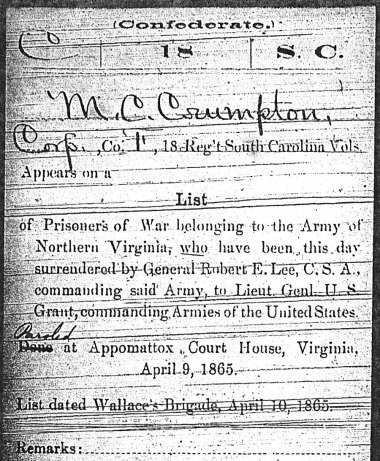I learned a great deal about the tumultuous life of Lucius Bunyan Compton during my three years at Eliada Homes. In his youth he was a rascal and ne’er-do-well, spending his days smoking tobacco and drinking bootleg whiskey. After he was saved at 20 years old, he spent the rest of his life helping the unfortunate children he called “the last, the lost, and the least,” and established an orphanage and a rescue home in Asheville, North Carolina. When asked later in life how he found salvation, he cited his father Miles Calvin Compton, the man he credited with giving him the strength to overcome the many adversities he encountered during his challenging journey.
But I always wondered about his father, that sturdy, pious mountain evangelist from Haywood County – a stolid one dimensional figure from the annals of his son’s amazing life. Who were his people, and how did he end up in Western North Carolina? His son’s biography stated that Miles struggled to provide for his wife Elizabeth and their large family, barely able to support their six children on his meager earnings. Lucius wrote about a youth filled with sharp hunger, bone chilling cold, and a shortage of sturdy shoes and warm clothing for the brutal Appalachian winters. But the rest? I was stumped. And then fate smiled upon me.
In 2001 Stewart Humphrey, the President and CEO of Eliada Homes, requested that I attend the funeral of Nettie McElrath, the niece of L.B. Compton. It was at the service in West Asheville that I met Ann Casey, Nettie’s daughter and Compton’s grand niece. When I asked her about Miles Calvin Compton, she agreed to show me a family newsletter from 1976 that provided details about his life.
But she was also suspicious about my intentions, and peppered me with questions about the oral history project’s scope and direction, the size of its budget, and any advances or royalties I might receive. Afterwards, Mrs. Casey sent me the following note:
“Whatever I do is in memory of my mother Nettie McElrath. It was very important to her that I write down everything about the Compton family. She always held Uncle Lucius as a role model and mentor to us. So many of my cousins grew up knowing and loving Uncle Lucius.”
“I really enjoyed your visit and getting to know you better. I only question your ability to handle the complete life of Uncle Lucius because of your age and lack of going through a similar path as a Christian. I like you. I trust you. But if you do not answer my correspondence, I will start snooping about you!”
–Ann Casey
——————————
I showed the letter to Stewart Humphrey. He responded to her questions promptly by e-mail, stating in part:
“Ms. Casey—My wife and I were very good friends of your mother. We were unable to attend her funeral and asked Cliff Davids who is working on an oral history for Eliada to attend her funeral on our behalf. Mr. Davids made me aware of some questions that you had regarding the oral history project.”
“At this stage we are simply gathering information about a great man and a great work. At some point in time we do hope to add to the body of writings already in existence. I can assure you that neither Cliff nor anyone else will benefit personally from this effort. Our sole purpose is to add to the archives at Eliada. Any information gathered from individuals or organizations will be documented and the source identified.”
–Stewart Humphrey
——————————
A Confederate Soldier
The photocopy of the family newsletter Ann Casey gave me that day revealed what I should have known all along – that Miles Calvin Compton was a stone-cold survivor. Compton was drafted into the Confederate Army as a teenager in 1862, and he left his wife and baby behind to fight in the bloody Civil War. He fought with the South Carolina 18th Infantry Regiment through some its deadliest campaigns, including the Second Battle of Bull Run, Antietam, and the brutal nine month Siege of Petersburg.
He saw action over three harrowing years before being taken prisoner at Five Forks in Virginia, and was paroled after the Confederate surrender at Appomattox Courthouse on April 9, 1865. From there, he began the long journey back to South Carolina, probably on foot. This war-hardened veteran returned home, converted and became an ordained preacher, and lived the rest of his life close to God.
The Civil War letters that he sent home to his father William M. Compton and Aunt Vashti were published in the 1976 family newsletter found below. Also included is an oral history of Compton family. It only hints at a story we will never fully know.
–Clifford B. Davids
——————————

The family of Miles Calvin Compton: (L-R) James Nelson, Lucius Bunyan, Thomas Jefferson, John Franklin, Emilia Compton Stroupe, William Francis, and wife Elizabeth (seated)
——————————
– COMPTON FAMILY ORGANIZATION –
Monthly Newsletter No. 13 / February 1, 1976
To: All Members of Record
We have no new members to report this month. I do have a wonderful batch of information to publish in this newsletter, which comes from Robert F. Compton of Badin, N.C. These are miscellaneous letters and bits of information that came from a trunk that Bob’s father Charles C. Compton owned.
I hope you will enjoy the following:
My name is Charles Carroll Compton of Laurens, S.C. Today is Dec. 26, 1941. Below is a brief story of the Compton family history as told to me by my Great Aunt Elizabeth Jane Compton (Aunt Lizzie). The marriages and records of birth and death taken from ledgers and family bibles of William McCauley Compton, Elizabeth Jane Compton, Josiah Compton, William Monroe Compton, and John Franklin Montjoy (my maternal grandfather) more than substantiate Aunt Lizzie’s oral report. She stated:
“Norris Compton was my great-great grandfather. At present it is not definitely known but Norris Compton or his father came from Ireland (probably Northern Ireland or Ulster) and settled in Virginia or North Carolina. It is definitely known that Norris Compton came to South Carolina while still a young man. It is known that he was married three times. However, there is no record in my possession of but one of these marriages.”
“From this marriage to Susannah Watson twelve children (six boys, six girls) were born. Of these children, William McCauley Compton was my great grandfather. He and the other children of Norris Compton and Susannah Watson were born in Spartanburg in what is now known as Cedar Shoals Church community and Waldrop’s Crossroads.”
“William McCauley Compton married twice. His first wife was Amelia Rainwater, and from this marriage MILES CALVIN COMPTON was born. Miles Compton married Elizabeth Gentry when he was a very young man (probably at the age of eighteen) and their first child, Thomas Jefferson Compton, was only a few months old when the Civil War started. Miles Calvin Compton entered the Confederate Army in 1862 and stayed with the Army until the end of the war.”
NOTE: I have in my possession a number of interesting letters written by Miles Compton to his father Wm. M. Compton and his Aunt Vashti Compton. These letters were written while he was a soldier with the South Carolina 18th Inf. Reg. of the Confederate Army from 1862 to 1865 (copies made by C.C. Compton Dec. of 1941):
——————————
– Civil War letters of Miles Calvin Compton –
Miss. Scott County
July the 28 ‘63
Miss Vashti Compton:
Dear Aunt I once more take my pen in hand to write you a few lines to let you know that I am well. I hope when these lines come to you they will find you well also. I have nothing good to write—only that I am well.
Dear Aunt I have not heard from you in a long time, and I want to know what in the world is the reason you don’t write or have something to say in some of Papa’s or Betsy’s letters. I am all most obliged to think that you have married and gone off to some distant land—so I shall not write any more on that subject. Dear Aunt I want you to write me as soon as you can and tell me all the news you can. I shall have to come to a close for the want of something to write. Nothing more…
I remain yours till death.
M.C. Compton
P.S. When this you see remember me though many miles apart we’ll be.
——————————
Near Petersburg, VA
July the 12th ‘64
Dear Father:
I take my pen in hand to write you a line to let you know that I am well and hoping when these few lines come to you they will find you all well. I have no news to write that is any ways good at all. I have no entrenchments and the Yankees are doing the same. There hasn’t been any fighting, only picket fighting for several days.
Dear Father, I received your kind letter yesterday bearing the date of 5th instant…I was mighty glad to get it and to hear that you are all well. That is always good news to me to hear that you are all well. Dear Father, I want you to write to me again as soon as you can and I will do the same to you.
So nothing more at present. I remain your true son until death
M.C. Compton
P.S. July the 13th…I am still well today and I hope that these few bad composed lines that come to you will find you all well and doing well. So write soon and often.
——————————
——————————
Aug. 12th /’64
Dear Aunt:
It is through the kind mercy of almighty God that I am permitted to write you a line to inform you that I am well and doing as well as can be expected. Aunt Vashti, I have seen some mighty hard times since I last saw you, but I have always struck up with good luck safer. Dear Aunt I want you to write me soon and often and I will do the same to you. So nothing more at present.
I remain yours until death
M.C. Compton
——————————
——————————
Petersburg, VA.
Feb. the 2nd 1865
Dear Aunt:
These few lines will inform you that I am well and I do hope when these few lines come to you they will find you well and doing well. I have good news to write to you at this time. I do wish I could see you and talk with you for I could tell you a heap more than I can write. I can’t tell whether we will see each other again or not, but I still feel in hopes that we will meet again on earth. If we should not meet again on earth I hope we will see each other in a land of peace where parting will be no more and hardships and wars not felt.
Aunt Vashti I see a heap of trouble about my folks at home, but if I just knew that I could ever get home again I would be better satisfied, but that is not for me to know. I shall just have to live in hope and trust in the Lord. Our duty that we have to do is very hard and our rations is very short. Be certain to write me a line soon and let me know how you are getting on in life.
So as I have nothing worth your attention to write, I will come to a close by saying write soon and often and I will do the same to you. Nothing more at present. I remain your true friend until death.
When you see this remember me though many miles apart we be.
Yours in love
M.C. to V.C.
——————————
——————————
So there you have everything that Robert F. Compton sent to me. I found this all extremely interesting. I realize there are many conflicts when we start to put the pieces together; however, this is to be expected. We can tell by these letters that Miles Calvin Compton had a great love and fondness for his Aunt Vashti…he named his baby daughter Vashti.
I regret that I can’t get all of our newsletters run on the xerox since it makes a much better copy. This one will have to go out on the ditto machine. So no more at the present time. I am anxious to hear from each of you.
Sincerely yours,
G. Roy Compton (February 1, 1976)
——————————







Cliff – I’ve really enjoyed reading these. Keep ’em coming.
These letters from a lonesome soldier show that not much has changed for those who must leave their family behind. In every type of separation–whether for war, job, moving, or even summer camp–we crave the news from home. This is a truism for all times, all generations, and all peoples. I hope that Miles Compton received his requested letters from home.
OMG…this is amazing! Thank you so much. I am the oldest grandchild of Nettie Compton McElrath!
Thank you for your reply. You have a fascinating family history.
Thank you so much for posting these letters. I am a distant cousin of M.C. Compton through his uncle, Aquilla Mangum Compton’s line. I stumbled across this page accidentally and I ended up finding it fascinating. I’ve quickly linked it to many members if my family. Thank you so much for your work.
Thanks for the comment, Scott. It’s always good to hear from a member of the extended Compton clan.
I would like to say that this is a wonderful site. The Comptons all seem to be very literal at a time when many people weren’t. I have a copy of a letter written to Monroe Compton from Aquila Compton – and the same can be said of him, as well as of James M. Compton, the son of Aquila and Co.F Hampton Legion.
Raymond M. Williams (descendent of James M. Compton)
So happy I found these stories about Rev. Compton! He truly had a life of challenges and deliverance. I am working on the history of our church (Crabtree Baptist – Haywood County) for our 200th anniversary this year. I am trying to find information on all our pastors from 1814 until now. The older ones are a little challenging, especially since they only used initials (M. C. Compton).
Anyway, Rev. Compton served at our church from 1892 until 1898. It’s told in our records that from December 1894 until April 1895 the church gave him a leave of absence because they couldn’t afford to pay him. I felt so bad when I read that. He truly loved people and the Lord to sacrifice so.
Lucy – Thank you for sharing the information on Miles Calvin Compton, and good luck with your project!
Hi! I recently received a picture (4th generation) of Tom and Annie Compton, Nettie Compton McElrath, Edward McElrath, and myself taken in April of 1950. I did not have any pictures of my great grandfather, and in fact I thought he died before I was born. Thank you for the picture of Tom and his family in this article.
I also remember Uncle Lucius. As a young child my grandmother would take me to his tent meetings, it seemed we went every night for a week and they were very dramatic. People crying and laying on the ground praying–it was actually a very scary memory for me. But he did inspire people. Thanks.
I enjoyed reading this tremendous story – thank you for preserving this history.
John Lee